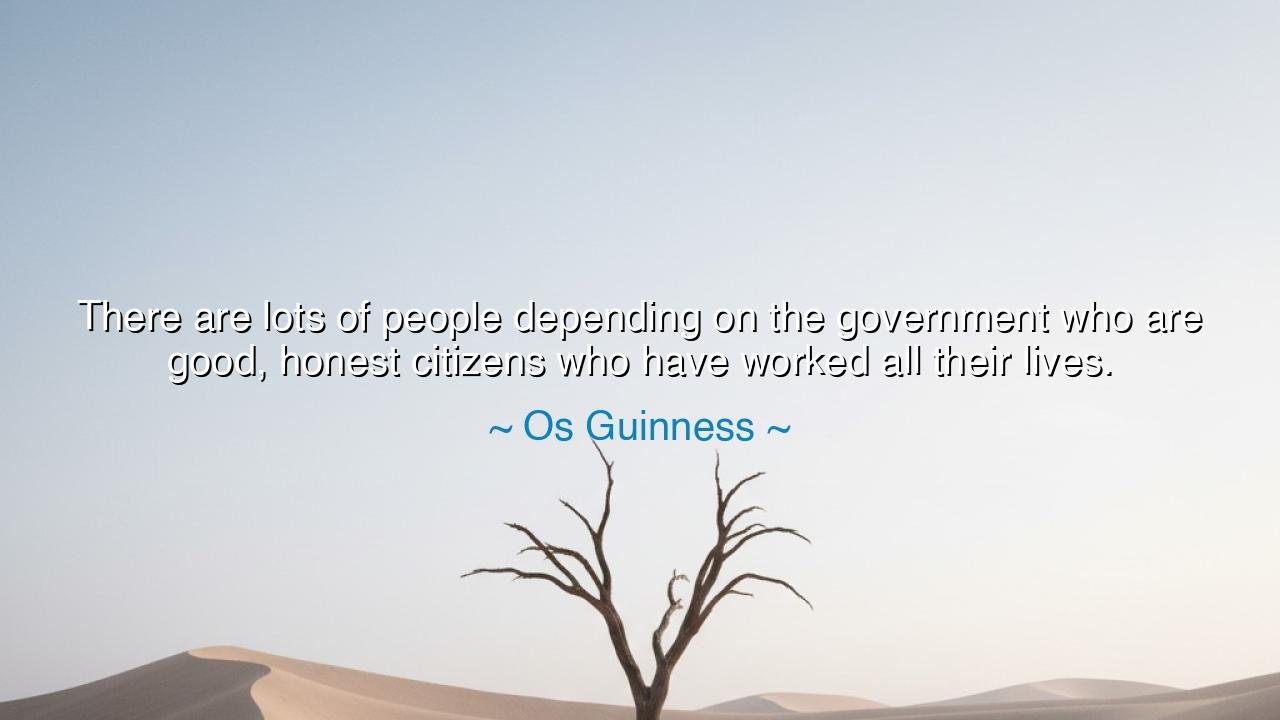
There are lots of people depending on the government who are
There are lots of people depending on the government who are good, honest citizens who have worked all their lives.






In the measured voice of compassion and truth, Os Guinness spoke a reminder that pierces the noise of politics and pride alike: “There are lots of people depending on the government who are good, honest citizens who have worked all their lives.” These words are neither praise nor rebuke—they are a call to humility, to see beyond the simple divisions of giver and taker, of rich and poor, of self-reliant and dependent. They summon us to remember that within every society, there exists a covenant between generations, a bond of duty between the strong and the weary, the fortunate and the vulnerable. For in the heart of dependency may still dwell the flame of dignity, and those who lean upon the state may yet be pillars of virtue.
To understand the weight of these words, one must first recall that Guinness—philosopher, social critic, and descendant of the storied brewers of Dublin—has long spoken on the moral foundations of freedom. He saw that liberty, without compassion, curdles into cruelty; and compassion, without responsibility, decays into dependence. His quote, spoken in the context of modern welfare debates, restores humanity to those often dismissed as “burdens” or “takers.” For he reminds us that many who now depend on the government—the elderly, the disabled, the poor—are not idle souls, but men and women who have labored in quiet faith, who have tilled the soil, built the roads, taught the children, and held the fabric of the nation together. Their reliance on aid is not shame, but the natural result of a life spent in service and contribution.
The ancients knew this truth well. In the old laws of Moses, the corners of the fields were left unharvested, that the poor and the stranger might gather grain and live. This was not charity, but justice—an acknowledgment that a community is judged not by the strength of its wealth, but by the compassion of its structure. So too, in the republics of Greece and Rome, there existed public provisions for the widowed and infirm. Even the proud Stoics, champions of virtue and self-discipline, taught that society owed care to those who had fulfilled their duties but were struck by age or misfortune. For the philosopher’s wisdom is this: independence is noble, but interdependence is divine.
Consider the story of the American Great Depression. In the 1930s, millions who had worked faithfully for decades found themselves destitute, not through sloth, but through the collapse of an entire economic order. Farmers watched their fields turn to dust; factory workers saw their machines fall silent. When the government created programs to provide food, jobs, and pensions, it was not charity extended to the undeserving—it was a nation remembering its covenant. Many of those who lined up for bread or worked under Roosevelt’s New Deal were the same who had built railways, fought wars, and raised families with courage. Guinness’s words echo this truth across time: dependence does not erase worth, and a good society recognizes honor even in the humblest need.
Yet his message carries another meaning—a warning wrapped in mercy. To acknowledge the virtue of the dependent is not to glorify dependency itself. Guinness, ever the student of liberty, understood that a society must guard the balance between compassion and self-reliance. When aid becomes entitlement, and when gratitude turns to expectation, the moral fabric frays. But when the strong look upon the weak with respect, and when the weak receive support with gratitude and integrity, the circle of community holds firm. The danger lies not in helping the needy, but in forgetting that all help must nurture dignity, not destroy it.
Let this truth settle deeply in the hearts of those who govern and those who judge. The elderly widow living on her pension, the veteran drawing disability support, the worker who lost his trade to time—these are not the enemies of progress. They are the living memory of a nation’s labor, and their dependence upon the government is but a reflection of the government’s dependence upon them in the days of their strength. Every generation, no matter how powerful, must someday lean upon the shoulders of another. To despise dependency, therefore, is to despise the natural order of human life.
And so, my children of the modern world, take from Os Guinness this enduring lesson: compassion is not weakness, and dependence is not disgrace. Look with mercy upon those who rely on aid, for many among them have borne the burdens you now take for granted. Do not let arrogance blind you to kinship, nor ideology silence your humanity. Work hard, yes—save, give, build—but never forget that the measure of a people’s greatness lies in how they care for those who can no longer labor beside them.
For in the end, every one of us will depend—on one another, on our communities, and on the unseen mercy that holds the world together. Let the rich remember their debt to the past, and the poor their worth before God. For as Guinness reminds us, even in dependence, there is honor, and even in weakness, there is wisdom. The government, in its truest form, is not a master nor a servant—it is the guardian of this sacred bond between citizens, born of shared work, shared duty, and shared grace.






AAdministratorAdministrator
Welcome, honored guests. Please leave a comment, we will respond soon